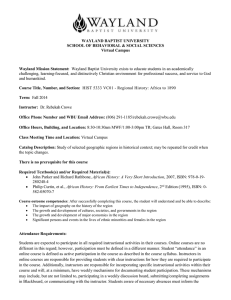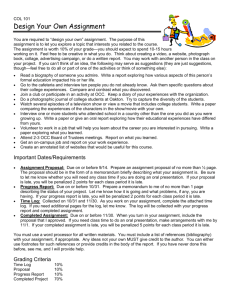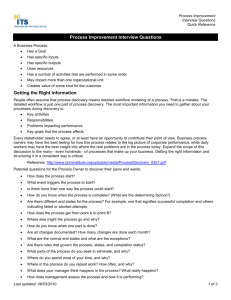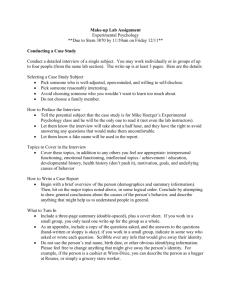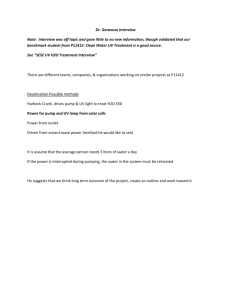Oral History - Wayland Baptist University
advertisement
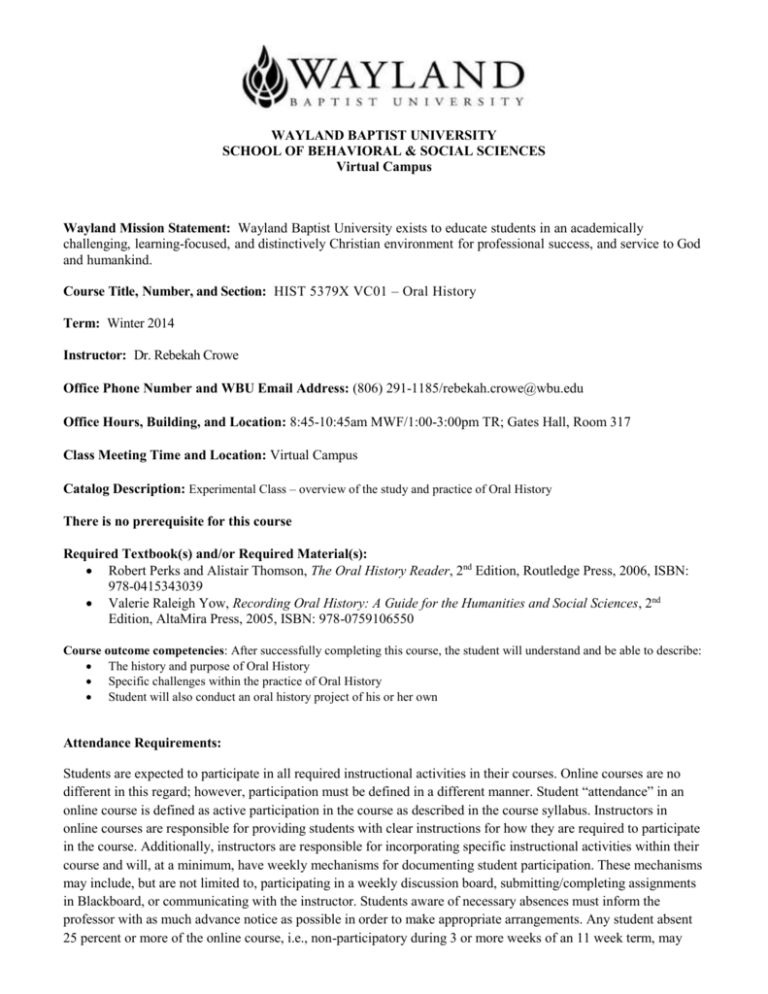
WAYLAND BAPTIST UNIVERSITY SCHOOL OF BEHAVIORAL & SOCIAL SCIENCES Virtual Campus Wayland Mission Statement: Wayland Baptist University exists to educate students in an academically challenging, learning-focused, and distinctively Christian environment for professional success, and service to God and humankind. Course Title, Number, and Section: HIST 5379X VC01 – Oral History Term: Winter 2014 Instructor: Dr. Rebekah Crowe Office Phone Number and WBU Email Address: (806) 291-1185/rebekah.crowe@wbu.edu Office Hours, Building, and Location: 8:45-10:45am MWF/1:00-3:00pm TR; Gates Hall, Room 317 Class Meeting Time and Location: Virtual Campus Catalog Description: Experimental Class – overview of the study and practice of Oral History There is no prerequisite for this course Required Textbook(s) and/or Required Material(s): Robert Perks and Alistair Thomson, The Oral History Reader, 2nd Edition, Routledge Press, 2006, ISBN: 978-0415343039 Valerie Raleigh Yow, Recording Oral History: A Guide for the Humanities and Social Sciences, 2nd Edition, AltaMira Press, 2005, ISBN: 978-0759106550 Course outcome competencies: After successfully completing this course, the student will understand and be able to describe: The history and purpose of Oral History Specific challenges within the practice of Oral History Student will also conduct an oral history project of his or her own Attendance Requirements: Students are expected to participate in all required instructional activities in their courses. Online courses are no different in this regard; however, participation must be defined in a different manner. Student “attendance” in an online course is defined as active participation in the course as described in the course syllabus. Instructors in online courses are responsible for providing students with clear instructions for how they are required to participate in the course. Additionally, instructors are responsible for incorporating specific instructional activities within their course and will, at a minimum, have weekly mechanisms for documenting student participation. These mechanisms may include, but are not limited to, participating in a weekly discussion board, submitting/completing assignments in Blackboard, or communicating with the instructor. Students aware of necessary absences must inform the professor with as much advance notice as possible in order to make appropriate arrangements. Any student absent 25 percent or more of the online course, i.e., non-participatory during 3 or more weeks of an 11 week term, may receive an F for that course. Instructors may also file a Report of Unsatisfactory Progress for students with excessive non-participation. Any student who has not actively participated in an online class prior to the census date for any given term is considered a “no-show” and will be administratively withdrawn from the class without record. To be counted as actively participating, it is not sufficient to log in and view the course. The student must be submitting work as described in the course syllabus. Additional attendance and participation policies for each course, as defined by the instructor in the course syllabus, are considered a part of the university’s attendance policy. Disability Statement: In compliance with the Americans with Disabilities Act of 1990 (ADA), it is the policy of Wayland Baptist University that no otherwise qualified person with a disability be excluded from participation in, be denied the benefits of, or be subject to discrimination under any educational program or activity in the university. The Coordinator of Counseling Services serves as the coordinator of students with a disability and should be contacted concerning accommodation requests at (806) 291- 3765. Documentation of a disability must accompany any request for accommodations. Course Requirements and Grading Criteria: Weekly Discussion Boards (110 points) Each student will contribute original discussion threads for each weekly assignment (varies by week) and two comments on classmates’ discussion threads for a total of 10 points per week based on the assigned reading. Original posts will be due by 11:59 p.m. (Central Time) on Wednesdays. Comments will be due by 11:59 p.m. (Central Time) on Sundays. Late posts will be penalized 1 point per every 24 hour period past the due date. Book Review (40 points) Each student will submit a 1,000-1,500 word (double spaced, 12 point font, 1 inch margins) review of an edited oral history collection of his/her choice; prior approval from professor required. Reviews will be due on Saturday, January 17, at 11:59 p.m. (Central Time). Late papers will be penalized 5 points per 24 hour period after the due date. Project Proposal (25 points) Each student will choose a theme or topic and find a group of 3 to 5 people to interview as the basis for all elements of the final oral history project. First, each student will submit a one page (double-spaced) proposal including the theme of the project, scholarly sources used for background information, and the names of possible interviewees. Late assignments will be penalized 5 points for every 24 hour period past the due date (Saturday, December 6, 11:59 p.m., Central Time). Practice Interview (25 points) Each student will conduct a practice interview, not for inclusion in the final project, of 15 to 30 minutes. A digital sound file of this interview will be due, along with a signed release form, on Saturday, December 13, at 11:59 p.m., (Central Time). Late assignments will be penalized 5 points for every 24 hour period past the due date. Sample Transcription and Index (50 points) Each student will prepare a sample transcription and index of one interview, covering at least 30 minutes but no more than 1 hour in duration. This part of the project will be due on Saturday, January 31, at 11:59 p.m., Central Time. Late projects will be penalized 5 points per 24 hour period after the due date. Edited Collection (200 points) Each student will prepare a ten to fifteen page edited collection based on his/her interviews and project. The final paper should include a two page introduction with background information on the topic, utilizing scholarly secondary sources; an edited selection of at least two pages for each interview; a two page summary of the project itself; a bibliography of all sources; and complete indexes signed release forms for all interviews. This assignment is due on Friday, February 13, at 11:59 p.m., Central Time. Late papers will be penalized 5 points per 24 hour period and will only be accepted until 11:59 p.m., Saturday, February 14, the official end of the Winter 2014 term. Method of determining course grade: Weekly Discussion Boards 110 points Book Review 40 points Project Proposal 25 points Practice Interview 25 points Transcription & Index 50 points Edited Collection 200 points 450 points total The University has a standard grade scale: A = 90-100, B = 80-89, C = 70-79, D = 60-69, F= below 60, W = Withdrawal, WP = withdrew passing, WF = withdrew failing, I = incomplete. An incomplete may be given within the last two weeks of a long term or within the last two days of a microterm to a student who is passing, but has not completed a term paper, examination, or other required work for reasons beyond the student’s control. A grade of “incomplete” is changed if the work required is completed prior to the last day of the next long (10 to 15 weeks) term, unless the instructor designates an earlier date for completion. If the work is not completed by the appropriate date, the I is converted to an F. Student grade appeals: Students shall have protection through orderly procedures against prejudices or capricious academic evaluation. A student who believes that he or she has not been held to realistic academic standards, just evaluation procedures, or appropriate grading, may appeal the final grade given in the course by using the student grade appeal process described in the Academic Catalog. Appeals may not be made for advanced placement examinations or course bypass examinations. Appeals limited to the final course grade, which may be upheld, raised, or lowered at any stage of the appeal process. Any recommendation to lower a course grade must be submitted through the Executive Vice President/Provost to the Faculty Assembly Grade Appeals Committee for review and approval. The Faculty Assembly Grade Appeals Committee may instruct that the course grade be upheld, raised, or lowered to a more proper evaluation. http://catalog.wbu.edu Tentative Schedule: Date Topic Assignments Week 1: November 10-16 Introduction/Development of Oral History Week 2: November 17-23 Varieties of Oral History Projects November 24-30 Thanksgiving Break Week 3: December 1-7 Preparing to Interview Project Proposal Due Week 4: December 8-14 Interviewing Practice Interview Due Week 5: December 15-21 Advocacy & Empowerment December 22-January 4 Christmas Break Week 6: January 5-11 Interpreting Memories Week 7: January 12-18 Edited Collections Week 8: January 19-25 Making Histories Week 9: January 26-February 1 Legalities & Ethics Week 10: February 2-8 Concluding the Project Week 11: February 9-14 Final Projects _______________ Book Review Due Sample Transcription & Index Final Projects Due

